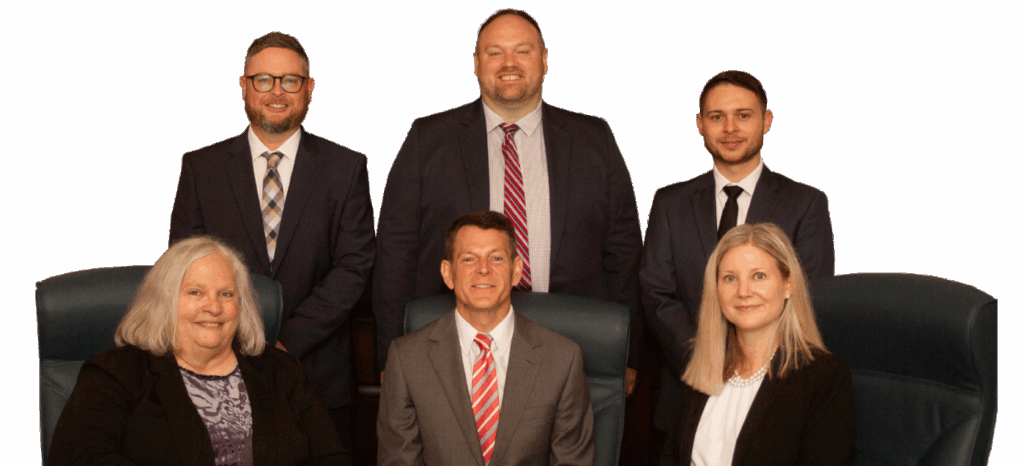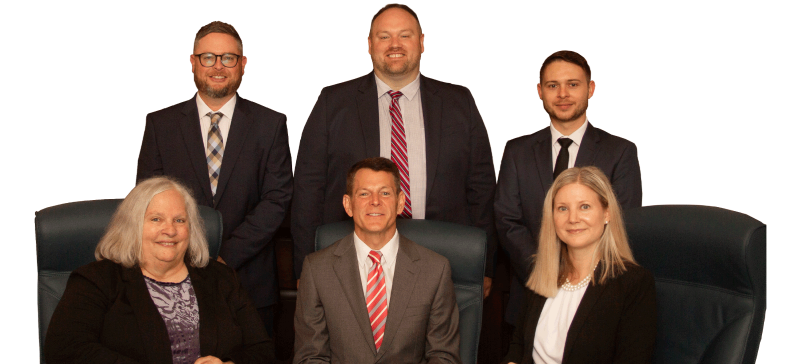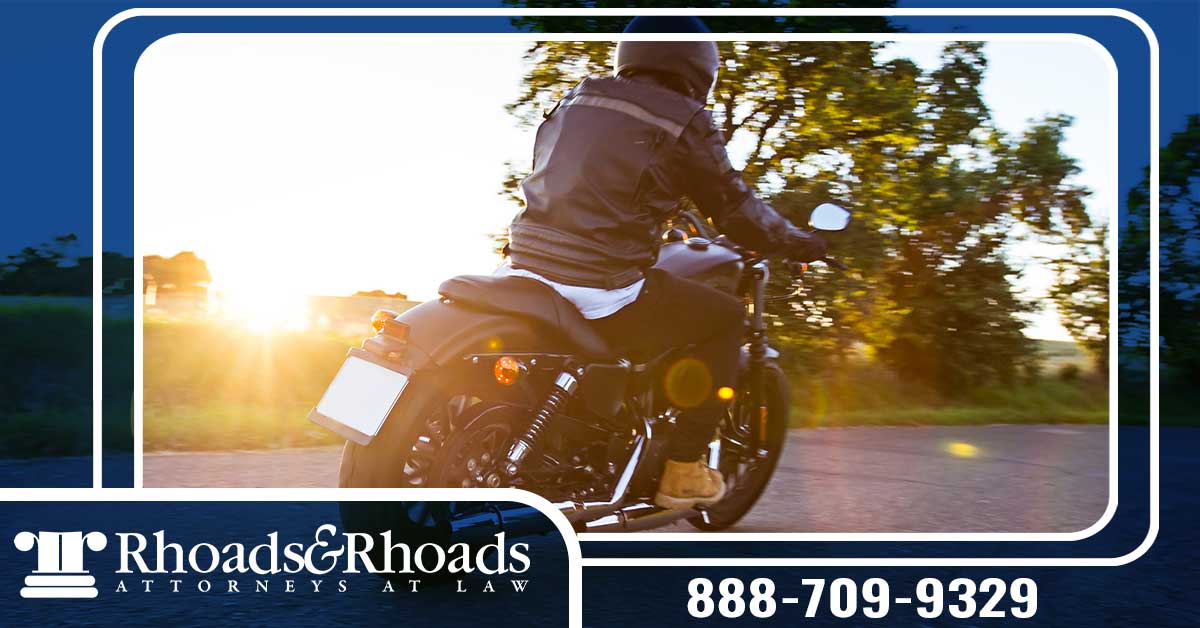
Motorcycle accidents and car wrecks often cause significant injuries, including muscle soreness. While these muscle aches often indicate somewhat mild damage, they may also be a signal that your body has suffered from more severe injuries. For that reason, it’s important to see a doctor if you’re experiencing muscle pain after a car or motorcycle accident.
Additionally, if you were in a motorcycle accident moments ago and are experiencing severe pain, it’s absolutely critical to seek medical treatment as soon as possible. You may have suffered from a life-threatening injury, especially if you experienced head trauma or suspect that you have spinal cord injuries. Call 911 right now and receive emergency medical care.
If you believe that you only suffered minor injuries and are now experiencing sore muscles, you may wonder how long the recovery process will take. In this blog, we’ll discuss how long muscle soreness typically lasts for minor injuries. We’ll also dive into what you should do after a traffic accident and how to recover compensation for motorcycle injuries.
In the event you have additional questions or need assistance filing an insurance claim against another driver, contact the motorcycle and car accident attorneys at Rhoads & Rhoads.
We have years of experience assisting Kentucky drivers after a car accident and can help you recover damages from the at fault driver’s insurance company.
Is It Normal to Experience Muscle Soreness After a Motorcycle or Car Accident?
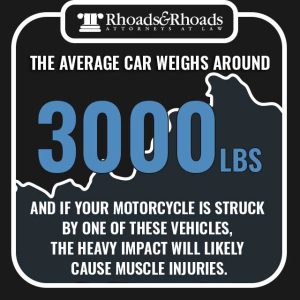
It’s common for traffic accident victims to experience muscle pain and soreness, especially after a serious collision. The average car weighs around 3,000 pounds, and if your motorcycle is struck by one of these vehicles, the heavy impact will likely cause muscle injuries. Additionally, the impact may eject a biker from their motorcycle, further contributing to muscle injuries and soreness.
Muscle soreness is often the result of soft tissue damage. You may have experienced a minor muscle strain or tear as well as damage to your ligaments and tendons. Additionally, you may experience soreness if the accident caused damage to your muscle’s surrounding organs, joints, or bones.
While standard passenger car drivers may also suffer from a minor muscle strain, a muscle injury or more serious injuries after a car accident, it’s more common for bikers. This is because motorcycles don’t offer the same bodily protection as enclosed vehicles, like cars and trucks. Further, a biker is also at risk from a severe road rash or another serious injury if their body makes contact with the pavement.
Tragically, motorcycle crashes are also more likely to cause fatal injuries or permanent physical disabilities, which may result from spinal cord or brain injuries.
If you suspect that you’ve suffered from a traumatic brain injury or another serious personal injury, you need to seek medical attention immediately.
How Long Does It Take for Muscle Pain to Heal?
The average amount of time it takes for soreness to heal is six to eight weeks, but there are many factors that may impact your ability to heal, such as the severity of your injury. If your wreck only caused minor soft tissue injuries, you’ll likely recover from your muscle soreness within only a few weeks.
If the wreck caused a massive strain, often referred to as a Grade III strain, you will no longer be able to use the muscle and may suffer from chronic pain. Grade III refers to a complete rupture of muscle, and this can impact numerous facets of your life, including your ability to work and perform certain motor functions.
Should I Seek Medical Attention After a Motorcycle Accident?
It’s best to receive medical care after a motorcycle or car accident, especially if you notice your soreness getting worse or if you suffer from muscle spasms. Your muscle soreness may be a symptom indicating a more serious problem, such as a severe tear or internal injury.

Even if you believe you only suffered minor injuries, it’s best to see a doctor, as they can perform diagnostic tests to uncover the extent of your damage.
Delayed Pain
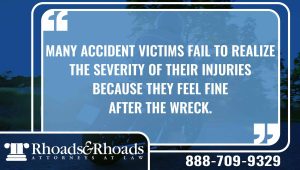
One important reason why you should seek treatment as soon as possible after an accident is that you may have delayed pain. Many accident victims fail to realize the severity of their injuries because they feel fine after the wreck. They may not begin experiencing muscle pain or other symptoms of an injury until days or even weeks after the accident.
Accident victims often experience delayed pain due to the initial shock of the experience. Motorcycle and car accidents are traumatic events, and your body likely released a great deal of adrenaline as a fight-or-flight response. The way our bodies react to pain after a car accident can vary.
This may numb your pain, making it challenging to tell if you’ve suffered from muscle injuries and other damage.
Unfortunately, this poses a serious obstacle if you eventually need to file a personal injury lawsuit. If you don’t seek immediate treatment after your accident, the at fault driver’s insurance company may argue that the accident didn’t cause your personal injury. They may claim that another event likely caused your pain or you have pre existing injuries that contributed to your affliction.
For that reason, it’s critical to see a doctor after your motorcycle crash even if you aren’t experiencing serious pain. This will protect your health and also your claim and increase your likelihood of recovering sufficient financial compensation for medical expenses, such as surgeries, prescription, and physical therapy.
Common Motorcycle Accident Injuries
Motorcycle and car accidents can cause a wide range of injuries, from mild, superficial injuries to life-changing, catastrophic wounds. As we’ve discussed, soft tissue injuries are exceedingly common after a wreck.
Other injuries include:
- Head Trauma
- Broken Bones
- Spinal Cord and Facet Joint Injuries
- Road Burns
- Whiplash
- Internal Injuries
Symptoms of Severe Injuries
Many of the most common motorcycle accident injuries are also the most deadly, and you need to be on the lookout for symptoms of these potentially life-threatening afflictions:
Traumatic Brain Injuries: Symptoms include headaches, loss of consciousness, insomnia, vomiting, nausea, memory loss, and trouble concentrating.
Internal Bleeding: Symptoms include abdominal muscle pain or tenderness, bruising, swelling, lightheadedness, rapid heartbeat, and low blood pressure.
Spinal Cord Injuries: Losing function or sensation in the limbs, trouble breathing, loss of bowel or bladder control, back muscle pain, neck pain, and weakness.
Internal Organ Injuries: Symptoms include nausea, vomiting, trouble breathing, chest pain, pain in the abdominal muscles, bruising, and swelling.
Muscle Spasms: Experiencing muscle spasms can be extremely painful and serious. It is important to seek a physical therapist or doctor.
If you notice these symptoms after a motorcycle or car accident, it’s critical that you seek emergency medical attention.
What Should I Do After a Motorcycle Crash?
If you’re physically able, you need to take immediate action after your motorcycle or car accident to protect your claim. You may not need to file a claim with the other driver’s insurance company, but it’s best to take all necessary steps at the scene of the accident just in case.
Ensure you follow these steps after a wreck:
- Call 911 if you or another person involved in the wreck requires emergency medical treatment
- Contact the police and wait for them to arrive
- Exchange contact and insurance information with the other driver
- Interview anyone who witnessed the accident and write down their contact information
- Take photos and videos at the scene
- Report the accident to your insurance company
Kentucky Motorcycle Insurance Minimum Requirements
In Kentucky, motorcyclists are required to have liability insurance in case they’re at fault for a wreck.
The requirements are:
- $10,000 for property damage
- $25,000 for the death or bodily injury of one person
- $50,000 for death or bodily injury of everyone involved in the accident
In addition to these minimums, motorcyclists can choose to obtain no-fault insurance.
Choice No-Fault State
Kentucky is a choice no-fault state, meaning that drivers can choose to obtain no-fault insurance. Drivers and riders who choose this option will go through their own insurance company to pay for their first $10,000 in medical expenses and wage loss (with limitations) resulting from the car accident, even if the other driver was at fault.
Those who choose this option need to obtain at least $10,000 in personal injury protection (PIP) coverage. However, your insurance company will then seek reimbursement from the at-fault driver’s insurance company.
Will My Insurance Company Pay For My Medical Treatments?
Your personal injury protection (PIP) coverage is intended to reimburse you for medical bills and lost wages after a wreck. Unfortunately, your damages may amount to far more than $10,000. Suppose that you suffer from multiple broken bones in your leg after a car accident. Your personal injury will likely require multiple doctors visits, surgery, and physical therapy. During this time, you may also struggle to work. These expenses add up fast and will almost certainly surpass your $10,000 of PIP coverage. Additional compensation for medical expenses, future medical expenses, wage loss, and pain and suffering can then be pursued against the at-fault driver’s insurance.
Can I File a Personal Injury Lawsuit After a Motorcycle Crash?
You do have the right to file a personal injury claim against the at fault driver or their auto insurance company for damages not already covered by your insurance.
Your injuries and expenses must meet at least one of these requirements:
- You have at least $1,000 in medical expenses not already covered by you PIP insurance
- The collision caused you to suffer from a permanent injury, disfigurement, or loss of a bodily function
- You experienced a compressed, compound, or displaced fraction of one or more of your bones
- You broke a weight-bearing bone
Types of Damages After a Motorcycle Accident
When filing a personal injury claim, you can seek compensation for various damages caused by your accident. This includes property damage and all medical bills, such as doctor’s appointments, surgeries, prescriptions, or visits to another medical professional.
You can also seek compensation for any wages for a temporary or permanent disability. For example, if the wreck caused injuries to your facet joints, you may suffer with limited mobility that impacts your ability to work. You can pursue damages compensating you for your reduced work capacity.
Of course, even minor injuries can potentially keep you from working temporarily, so you can seek reimbursement for your time in recovery.
Pursuing Damages for Pain and Suffering
In addition to damages related to financial recovery, you can pursue compensation for the physical, mental, and emotional pain and suffering you experienced from the wreck, such as physical discomfort and mental anguish. The accident can severely impact your physical health and may cause debilitating chronic pain from a muscle injury, especially if you suffered from a severe broken bone, brain trauma, or a spinal cord injury.
You may also suffer from new limitations or disabilities, causing pain while also negatively impacting your quality of life.
Pain and suffering damages compensate you for mental and emotional problems caused by the accident, such as newly developed anxiety, depression, post-traumatic stress disorder, and mental anguish.
Proving the At Fault Driver Was Liable For Your Motorcycle Accident
To recover damages from the other driver or their auto insurance, you’ll need to provide sufficient evidence that they were at fault for the motorcycle accident and that you suffered damages as a direct result.
Some forms of evidence include:
- The police accident report
- Photographic and video evidence
- Eyewitness testimony
- Cell phone records indicating the other driver was distracted
- Traffic violations issued to the other driver for the wreck
- Testimony from an accident reconstruction expert
Once you establish the other driver was at fault, you’ll need to prove that you suffered damages. Forms of proof include:
- Doctor’s notes
- Expert medical testimony
- Medical records
- Medical bills
- Documents proving you missed work
- Testimony from friends and family about your emotional state
- Testimony from a mental health professional
- Prescription records
What If I Was Partially At Fault?
Kentucky uses what’s known as pure comparative negligence system, meaning that you can still recover damages even if you were partially at fault. Your degree of liability will directly impact the amount you can recover from the other driver. For instance, if you were considered 50% liable for the accident, that will reduce the amount you can recover by 50%.
Contact a Motorcycle Accident Attorney Today
If you suffered from a serious injury or even just a muscle injury that won’t be covered by your personal injury protection insurance, it’s best to contact an attorney as soon as possible. An experienced lawyer will help you by gathering evidence of your claim and will present your claim on your behalf.
Here at Rhoads & Rhoads, our motorcycle accident lawyers have many years of experience representing Kentucky residents in car accidents, truck accidents, and more. We’ll fight on your behalf so that you recover the full compensation you deserve for your damages.
You can get a free consultation and case review with us today by calling 888-709-9329, or you can contact us online here.

